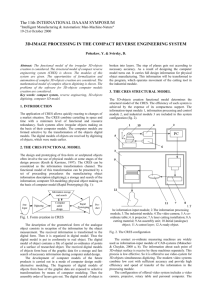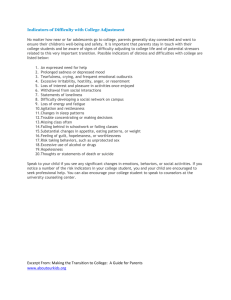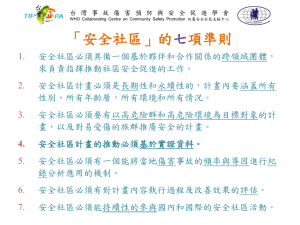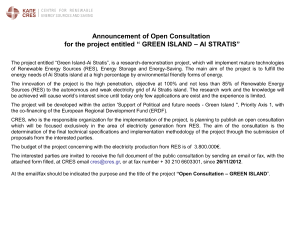13 Response_Greece_CRES
advertisement
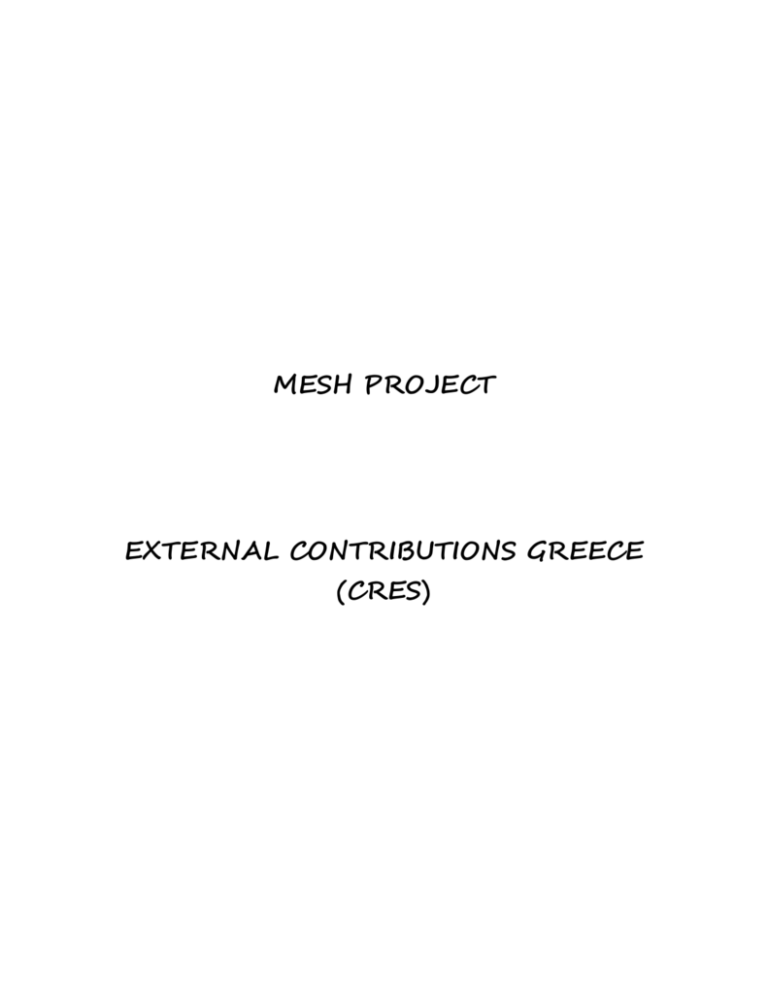
MESH PROJECT EXTERNAL CONTRIBUTIONS GREECE (CRES) Dear Jesus, Please find attached our proposal of what we consider as possibility for our contribution at your project as subcontractors. Is an outline description of our potential contribution, which of course can be further adjusted and based on the identified needs of your project. Please let me know if you need/request any additional information that could be valuable for you, in reference with our proposal. The proposed different items can be further restructured if of course other needs are identified at your next project meeting. Best regards, Yannis CRES’s contribution to the Manual for Statistics on Energy Consumption in Households Background CRES has vast experience in the fields of energy policy and energy systems analysis both at national as well as at European level. Its participation to projects involving other Member States (MS) has assisted in gaining experience with the relevant energy issues that concern them, along with the identification of legislative, regulatory and technical barriers that may embed difficulties in the implementation, monitoring, reporting and evaluation process. Moreover, CRES has been part of the European Energy Network (EnR) network and the Concerted Action for Energy Performance of Buildings Directive, the Concerted Actions for Energy Services Directive and the Concerted Action for RES Directive. CRES is also the responsible body for supporting the Greek Ministry of Environment, Energy and Climate Change in relation to the new European Policies for Energy, assessing and monitoring the national RES & EE targets, formulating fiscal programs, as well as producing and reporting the national action plans and relevant progress reports. CRES’s working team is composed by qualified engineers with a specialization in the energy sector and long-time experience in energy processes related to the exploitation of primary energy, the processing for energy production as well as the transfer, distribution and final consumption of energy. CRES is the national responsible body for the collection and transmission of primary data on RES heating and cooling to the Greek Ministry of Environment, Energy and Climate Change. Furthermore, CRES supports the Ministry by cross-checking the relevant annual questionnaires on RES and Electricity with the respective data from its own database. Moreover, CRES’s working team has been involved directly with national and European energy statistics from their initial collection and assessment to their elaboration, development and maintenance of energy data databases. Furthermore, through a variety of national and European projects CRES’s working team has gained experience in using the energy statistics into developing energy models and forecasting tools for energy-related indicators and issues. Finally, CRES’s working team has recently participated in a training on statistics including the initial set-up for data collection, data treatment and assessment and statistical analysis methods. Technical description CRES will be able to contribute to the pre-designated structure of the manual, by providing specific expertise in regards with the collection of data related to energy efficiency and renewable energy sources in the residential sector. Moreover, CRES can contribute in considering the inclusion of specific approaches in the collection of energy consumption data for estimating additional energy indicators that may be particularly important for the scope of energy statistics and energy policy. CRES’s contribution will be focused in WP 2 and 3. 1st alternative The first proposed alternative for CRES’s contribution to the Manual for Statistics on Energy Consumption in Households refers to the following thematic groups as described in the manual structure: 1. Chapter 3: Information needs and definitions 2. Chapter 9: Consideration of the renewable energies The analysis that will be held by CRES in the aforementioned chapters will particularly consider all the requirements and obligations that derive from the EU Directives regarding energy efficiency, energy performance of buildings and promotion of renewable energy sources and apply to the residential sector. - Information needs and definition CRES’s contribution to this chapter will be the examination, assessment and proposal for specific Key Performance Indicators (KPI) on energy statistics regarding energy consumption in households. The role and the significance of KPI on energy statistics will be firstly examined. A detailed review of proposed KPI in the residential sector will be performed in order to study successful applications of these indicators and to identify the most efficient of them. Then, the most representative KPI will be selected and incorporated within a methodological framework, which will provide valuable information to the field of energy statistics. Specifically, an analysis of the means for estimating these indicators during statistical surveys and analyses will be performed, followed by the provision of indicative examples and guidelines. Moreover, an analysis regarding the utilization of the proposed KPI will be implemented taking into consideration the requirements of energy legislation and reporting by the MS in EU. - Consideration of renewable energies The renewable energy sources, which are utilized in the residential sector, will be presented and analyzed with the scope of sufficiently integrating them in the proposed methodological approaches regarding statistics on energy consumption in households. This will include the technological description of each energy source/technology and the presentation of the current status regarding the achieved penetration at national and European level, based on current available energy statistics. Moreover, the necessary metrics for the most realistic depiction of the current penetration will be analyzed, emphasizing on the definition of both technological (capacity, power etc.) and energy (electricity and heat production, electricity consumption etc.) figures. Due to the fact that the provision of some energy metrics from consumers is not always feasible, it is crucial to propose suitable approaches to obtain the necessary technological data and, if required, implement specific assumptions to calculate the various energy figures. Therefore, all the necessary technical assumptions will be explicitly described and a methodological approach will be developed. The efficient definition of technological and energy metrics will lead to the development of representative indicators for the evaluation of renewable energy sources penetration in the residential sector. Furthermore, the possibility of eliciting the proposed indicators during the conduction of statistical surveys will be examined. Specific examples and guidelines will be provided so as to reassure the effective estimation of indicators through the various statistical approaches (surveys, administrative sources, etc) for data collection on energy consumption in the residential sector. Finally, the major technical constraints and uncertainty factors will be evaluated regarding their impact on the obtained results. 2nd alternative The second proposed alternative for CRES’s contribution to the Manual for Statistics on Energy Consumption in Households refers to the undertaking of the aforementioned thematic groups (as described in the first alternative) as well as the consideration of two additional subjects of particular interest. The first one is already considered in the manual structure and refers to energy/fuel poverty and the second one refers to the rebound effect, which is proposed to constitute a new chapter in the manual. Scope of these chapters will be a methodological approach to include these indicators in energy statistics and start considering them at regional, national and European level. The proposed methodological approach will consist of the provision of definitions and the relevant uses and applications of these indicators, the evaluation of different variants for their definition and implementation in energy policy analysis, the identification of the required data for their assessment and a proposal for a methodological approach to collect the required statistical data. Energy poverty This task will consist of a detailed description of energy poverty, its definition and its role in energy statistics and energy policy analysis, followed by the identification and presentation of its components. The analysis will be focused in the examination of the main factors that affect energy poverty, through an in-depth review of implemented studies giving emphasis on the various attempts conducted for the quantification of energy poverty. The main objective of this task will be the presentation of a robust methodological framework for the quantification of energy poverty incorporating a proposal for the collection of representative figures to facilitate the effective depiction of the examined phenomenon. The selection of appropriate indicators among the various alternatives (as depicted by the review) will be the most challenging part of this task, considering that it is crucial to ensure a uniform and highly representative depiction of energy poverty and facilitate its utilization in energy policy analyses. A comparative analysis of each indicator’s advantages and disadvantages will be also performed. Based on that, a methodological approach to collect the required statistical data will be planned, considering specific question types and defining guidelines for the fulfillment of the target. Due to the fact that a variety of indicators will outcome, the synthesis of a total indicator for energy poverty will be performed incorporating all components. The synthesis of this indicator is vital in case it is utilized for the evaluation of energy policies or measures in order to assess and monitor energy poverty in the various MS. Finally, issues concerning potential uncertainties will be assessed in order to analyze their impact on the calculated indicators. Rebound effect A brief description of the rebound effect and its definition will be presented in this task focusing on the factors, which formulate the specific phenomenon. A review of scientific studies and papers will be performed in order to identify its relation with energy consumption and to study potential approaches realized for the quantification of the rebound effect. The aim of this task entails the presentation of a specific methodological framework for the quantification of the rebound effect and the development of representative indicators for a more realistic depiction of the examined phenomenon. Since the assessment of the corresponding indicators that quantify the rebound effect is not too complicated (compared to energy poverty, for example), most of the effort will be laid in developing a methodological approach to facilitate the availability of and access to the required data. Potential technical constraints for this procedure will be examined thoroughly and solutions will be suggested in order to handle them and to minimize the negative effects. Furthermore, the provision of specific examples and guidelines will lead to the estimation of the proposed indicators during the conduction of statistical surveys highlighting their relation with energy statistics. Finally, an uncertainty analysis will be performed to analyze the impact and the potential fluctuation of certain factors to the obtained indicators. Economic terms 1st alternative The proposed financial offer for the implementation of the first proposed alternative by CRES as subcontractor to the MESH project is 10,000.00€ (includes all overheads applied for CRES). 2nd alternative The proposed financial offer for the implementation of the second proposed alternative by CRES as subcontractor to the MESH project is 18,000.00€ (includes all overheads applied for CRES).


